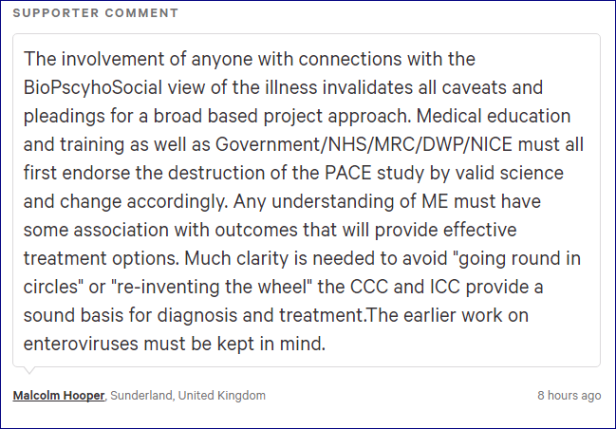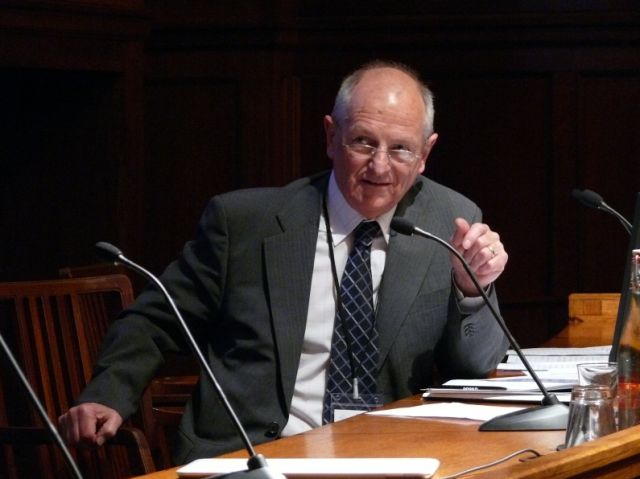Two of the UK’s staunchest advocates make a statement about MEGA.
There is an urgent need for high quality biomedical research into ME/CFS that is untainted by the influence of members of the biopsychosocial school who believe that the disease is perpetuated by dysfunctional beliefs and behaviour.
The proposed MEGA study (ME/CFS Epidemiology & Genomics Alliance) has the potential to provide a deeper understanding of the biology of ME/CFS by investigating the distinctive genetics, epigenetics, proteomics and metabolomics of people with ME/CFS, but the involvement of Professor Peter White, Chief Principal Investigator of the PACE trial, and Dr Esther Crawley is deeply troubling.
We believe their approach to research does not comply with essential tenets of the scientific process such as the primacy of objective over subjective measures, the requirement to adhere to pre-specified outcome measures and the need not to exaggerate results.
Before the re-analysis of the PACE raw data, Esther Crawley co-authored a paper which claimed up to 40% recovery in the PACE trial participants (BMC Health Services Research 2011, 11:217 doi:10.1186/1472-6963-11-217).
It is also of concern that Dr Crawley is involved in a paediatric study of the psycho-behavioural Lightning Process which is widely considered to be pseudoscience; furthermore, despite the obvious failure of the PACE trial, she has embarked on a study of graded exercise in children.
Hence their influence in the design and execution of MEGA could undermine the integrity of the whole study.
Pragmatic concerns relate to the size and feasibility of the endeavour which seeks to recruit 12,000 people with the disease. The PACE trial had to assess 3,158 individuals to find 641 who met the broadest definition of “chronic fatigue” (the Oxford criteria) and who were willing to participate in the study. If the same ratio applies in MEGA, then about 60,000 people will have to be assessed to find the 12,000 said to be necessary to tease apart the presumed subgroups that fall within such a broadly defined cohort.
Furthermore, such a large study group severely limits the range and quality of testing that can be applied to each individual due to budgetary constraints. Even with funding of £10 million, the most that could be spent on each participant would be around £800, and most likely far less due to administrative costs.
Would a better understanding of the disease not emerge from more in-depth investigations of a smaller but better characterised cohort?
Professor Holgate’s stated belief that “CFS” could be as many as fifteen separate conditions may well be true, but this traps us in a circularity: if you believe that “CFS” is no more than broadly defined chronic fatigue and design your study on this basis, then of necessity you will capture people with many different underlying conditions (which would fulfil the psychiatrists’ current infatuation with MUPS or medically unexplained physical symptoms).
Hence we are concerned about the use of what Dr Crawley refers to as the “NHS criteria”, which can only be the criteria set out in the NICE Guideline CG53 with which she was closely involved and which are non-specific and have not been operationalised and moreover have been superseded by internationally accepted criteria.
A final issue is the central role of AfME as the supposed voice of patients, given their enthusiastic collaboration with the PACE trial and their failure to unequivocally condemn its many failings.
Professor Malcolm Hooper
Margaret Williams24th October 2016
The above statement is in pdf (click here )
Professor Malcolm Hooper also kindly left a comment on our petition –
Opposing MEGA – A Vote of No Confidence in MEGA Research for M.E.

See also –
Catalogue of articles by Professor Malcolm Hooper and Margaret Williams
Statement by Invest in ME Research October 2016
Comment by Professor Jonathan Edwards October 2016
1,000 Signatures in 4 Days! Find out why….
Sign our petition here –
Opposing MEGA – A Vote of No Confidence in MEGA Research for M.E.


Thank you for expounding so clearly, what many well-informed patients feel about the proposed MEGA research project.
I’m quite sure that if good science was allowed to become the overriding objective, then MEGA could yield some helpful data, but in its present (unscientific & politically driven) form, it will deliver nothing, except for more wasted time, money and opportunities.
LikeLiked by 2 people
Thank you for your comment Paul.
LikeLike